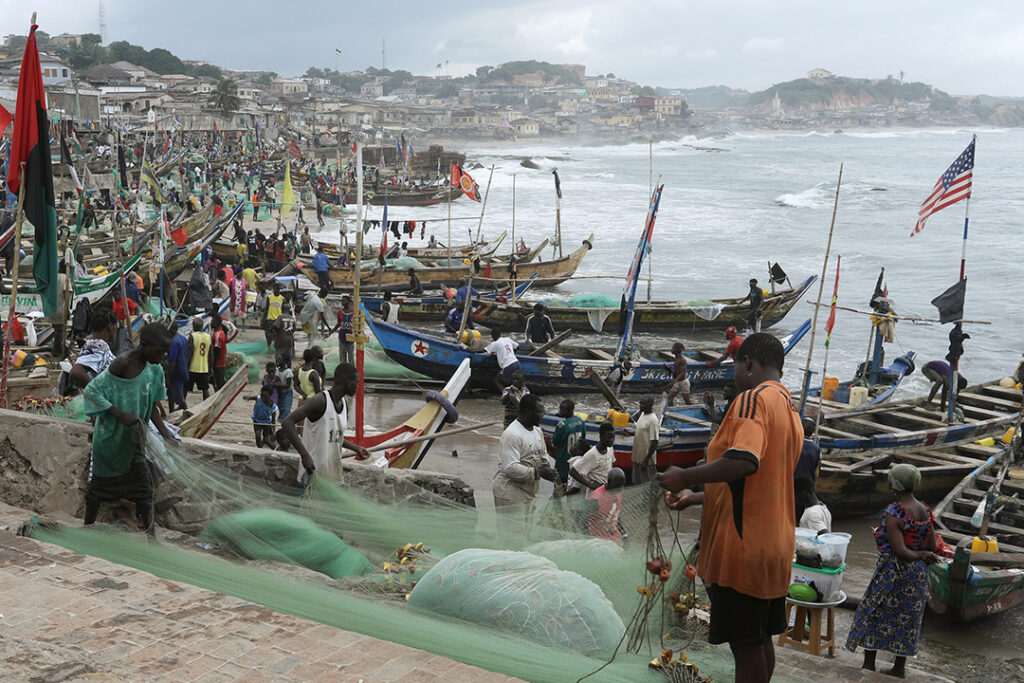ADF STAFF
A year after Benin, Ghana and Togo reaffirmed their willingness to work together to reduce illegal fishing, some fishermen in the region say its badly depleted fish stocks show signs of improvement.
Besides at-sea patrols, the countries share information from the Regional Monitoring, Control and Surveillance Centre in Ghana, formed in 2021 by the Fisheries Committee for the West Central Gulf of Guinea (FCWC).
But those most at risk insist there is still work to do. Many people in the region are still going hungry as foreign fishing vessels plunder their waters.
Geoffroy Gbedevi, a fisherman in Benin, said he struggles to feed his family.
“At the moment we are suffering a lot,” Gbedevi told Voice of America (VOA). “The number of fish that we manage to catch now is much lower than what we used to.”
Most illegal fishing vessels in the region are Chinese. China commands the world’s largest distant-water fishing fleet and is the world’s worst illegal, unreported and unregulated (IUU) fishing offender, according to the IUU Fishing Index.
Analysts say 40% to 60% of all fish are caught illegally in West Africa. According to a new report by the Financial Transparency Coalition, more than 40% of the world’s IUU fishing happens in West Africa. The region loses anywhere from $2.3 billion to $9.4 billion annually to illegal fishing.
In Ghana, 90% of illegal fishing boats are Chinese-owned, although many are flagged to Ghana, according to the Environmental Justice Foundation (EJF).
That is a process known as “flagging in,” meaning that foreign companies use and abuse local rules to flag a foreign-owned and operated fishing vessel into an African registry and fish in local waters. It helps a vessel’s owners dodge financial charges and other regulations. There is little oversight of the online open registries.
EJF CEO Steve Trent told VOA he believes basic transparency measures, such as attaching a number as a vessel’s “identifier,” will help authorities better track fishing vessels.
Susan Steele, executive director of the European Fisheries Control Agency, said that besides cooperation, the countries need improved legislation, operations and training to combat illegal fishing.
Duncan Copeland, executive director of Trygg Mat Tracking, told ADF in an email that Benin, Ghana and Togo, as well as Côte d’Ivoire, Liberia and Nigeria, have worked to update their legislation in recent years. That includes ratifying the international Port State Measures Agreement.
Trygg Matt Tracking helps the countries improve their monitoring, control and surveillance efforts.
“Another FCWC initiative that is now in development is to have a coordinated closed fishing season across the member states, building on the steps taken by Ghana and which will soon include Benin, Togo and Côte d’Ivoire, and potentially later the other members,” Copeland said. “Operational capacity is still a big challenge, particularly patrol capacity, and needs focus and resourcing.”
However, Copeland said all six nations have improved their ability to keep trawlers out of areas reserved for artisanal fishermen.
“The countries in the region, and the FCWC, have been global leaders in developing effective partnerships, particularly state and non-state actor partnerships, and this is and will be an important part of the regional anti-IUU strategy,” Copeland said.

